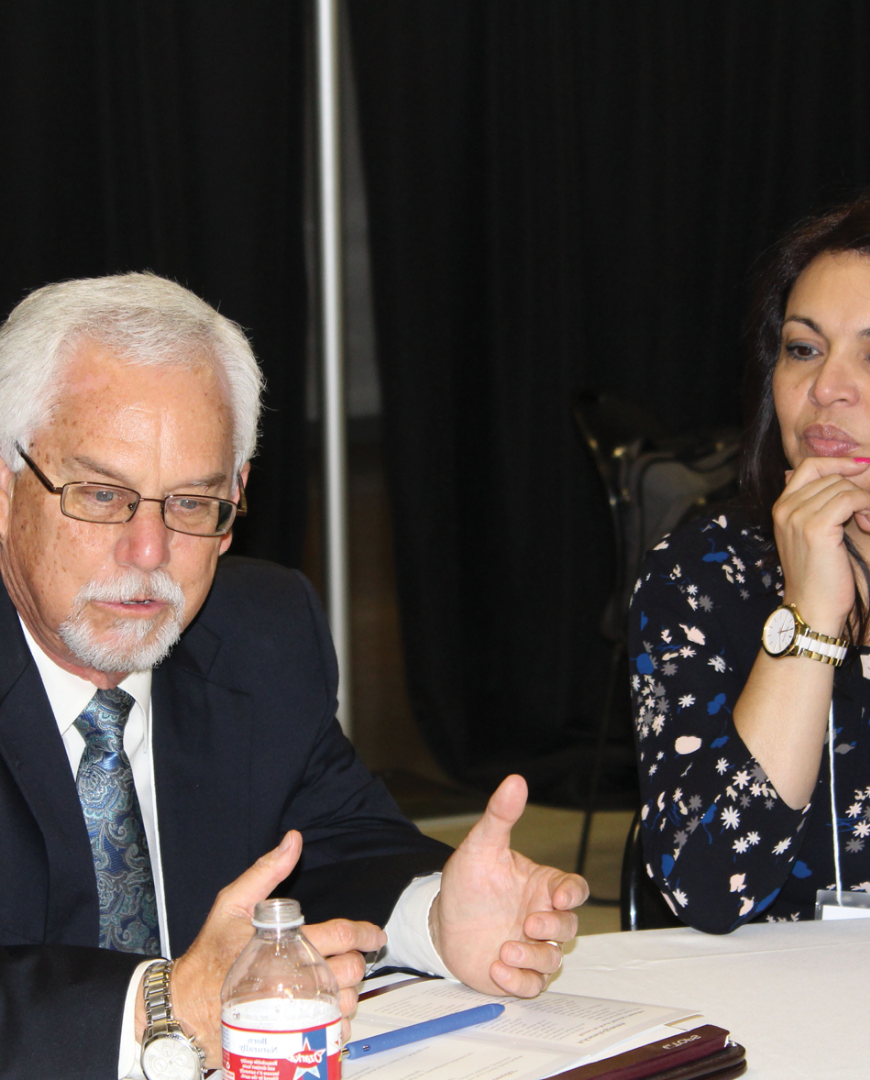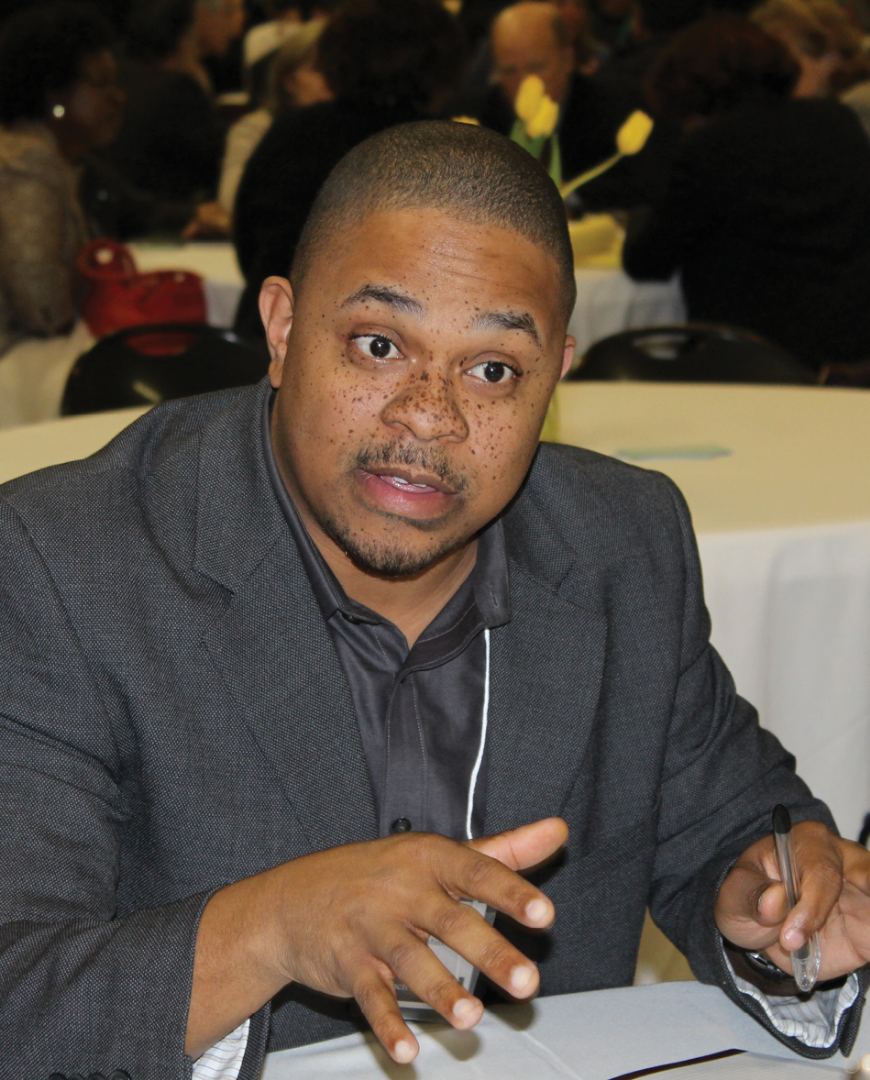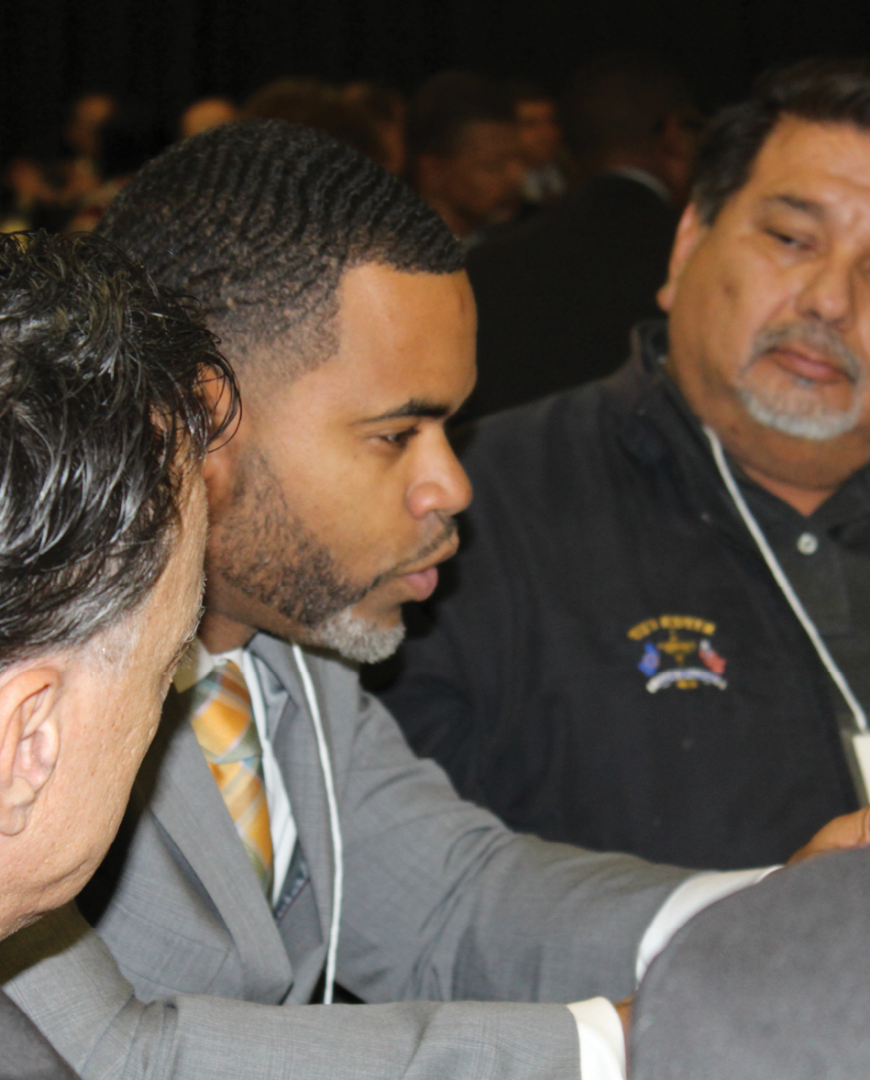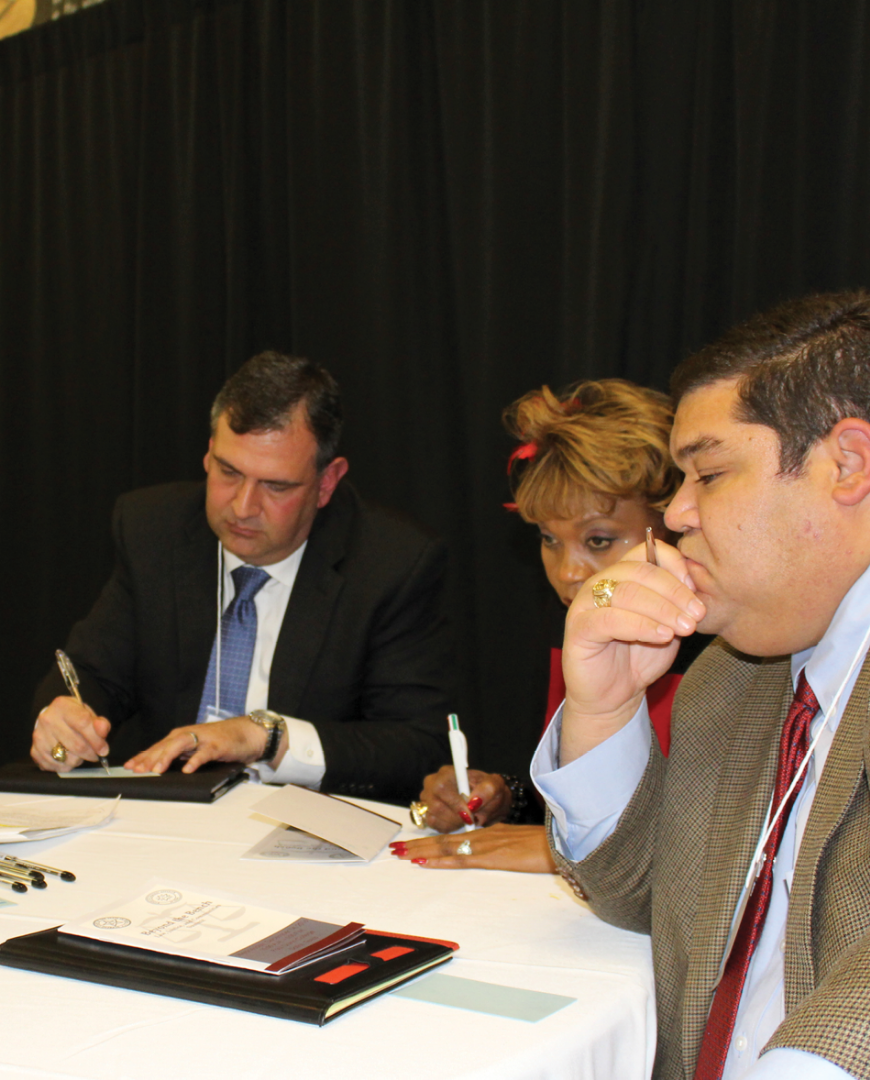Beyond the Bench: Law, Justice, and Communities Summit
Big Ideas from Afternoon Breakout Session
- Download the Big Ideas
Participants were asked to submit “big ideas” in response to a question designed to spur action:
What is a practical first step you can take now to bring about change in your community, profession, organization, or agency?
The top 5 ideas all received a perfect score when ranked by event participants.
- Take this dialogue to new venues – churches, schools, courthouses and the Legislature.
- Mandate training/education regarding cognitive/implicit bias for all stakeholders in the criminal justice system.
- I am going to encourage stakeholders in my community to organize and participate in similar forums.
- Remove political influences from judges and prosecutors.
- Develop a childhood app that helps children to recognize bias at a really young age. They have pattern games. Why not something that changes how they group people, cultures, etc. on the common thread that isn’t an easily seen pattern but has a commonality.
The remaining ideas ranked highly and are listed by category below.
Accountability

- Every institution is required to have a racial and bias audit that is public for accountability.
- Ask an independent party or organization, outside of the justice system, to begin tracking convictions, punishment and compare with demographics including race. Perhaps a college or university?
- Accountability – for everyone at every level.
- Transparency, truth and justice for all.
Awareness
- Educational campaign highlighting injustices due to race using current statistics, maybe social media.
- Bias Awareness – people are opposed to the idea that we all have personal biases that influence personal decisions. I will begin talking about the influence of bias in my own decision-making with the goal of normalizing the concept of personal bias so others can begin to examine that for themselves.
- I think schools should bring middle schoolers down to the courts and judges and prosecutors should visit schools.
- Advocate and make people aware of the roles that we play in our society. Take the information back to my state board and discuss policy changes around the human race and equity.
- Eliminate bias toward poverty.
- Promote understanding of how destructive poverty is.
Community Efforts
- Develop a community collective impact committee to identify major barriers to reducing the “tough on crime" criminal justice system for poor people.
- Restorative Community Building Circles in the city that allow for open dialogue. These can be done at a town hall meeting or church.
- Find ways to keep families together.
- Encourage congregations to have conversations with police (without getting traffic tickets). Encourage congregations to have conversations with other races and genders about once a month.
- Engage more with community citizens outside of the stakeholder. Schedule out quarterly meetings or events to bring the less-likely citizen and those in the justice community.
- Bring church and faith-based community into child welfare/judicial arena vis-a-vis bias and better outcomes for kids.
- Community race ambassadors meet over lunch to talk race relations.
- Community breakfast in your local area with stakeholders to listen and learn about problems/challenges/solutions.
- Invite community to be a part of identifying problems that impact them and develop the solutions. The people closest to the problem have the best answer, yet often are absent.
- Find ways to expand opportunity areas to poor minorities in Austin, with a focus on affordable housing.
- Community discussions work better when we include decision-makers and power brokers to the table to move forward. Honest dialogue.
- Have monthly community meetings with schools, CPS, Police, DAs, judges. Have an open forum meeting.
- Provide more opportunities for ex-offenders. For example, recruit companies within the church.
- Get beyond talking, seminar and summits to ACTION. Come out of offices, courtrooms and into the communities (via community leaders and organizations) and get to know those your decisions impact.
- Monthly meetings with different professionals/workers/constituents in my field to share perspective on a pertinent mutual interest.
Courts

- Initiate more diversion courts/programs into the criminal justice system for both adult and juvenile.
- As a trial judge, I will work harder on making sure I’m conscious of my facial expressions in court, looking each person who appears before me in the eye, and being as pleasant as possible to them.
- I’m going to be accountable for my own sentencing and punishment by race.
- Get philanthropy groups to invest in alternative court programs so more young offenders have access to them and to mentors.
- Read the trial records as a human story rather than cold facts, where possible.
- Change the court-appointed system to give poor people a fair chance.
- Judges should ask criminal defendants about their background, and also collect data on race to evaluate their performance.
- Make an effort to have more diversity on grand juries. This is where bias in the felony criminal justice system can really affect what happens on down the line.
- Educate all members of the criminal justice system about the various roles others have, to create a more unified system that can help with all aspects of need and individuals.
- Judicially-chartered community meetings across Texas to discuss planning, data, and desired outcomes in the context of the administration of justice.
- Evaluation and checking assumptions. For example, does racial bias exist in charging or sentencing? Plan to conduct an audit.
- Being more deliberative when making a decision in court.
- The addition of drug, mental and veteran courts in every Texas district court. Mandatory judges and district trainings annually in regions to coach it, led by this collaboration.
- On a court of appeals, consider normal/frequent suspicions held by participants/parties and try to address that in open court or in your opinion.
Data
- On a statewide basis, collect individual data by judge and make available to them on disparities.
- Examine data in my system and ask the questions to colleagues about why that data looks that way.
- Start to track outcomes with kids and families (detention outcomes, services offered, etc.) and have quarterly discussion to review data and analyze.
- Self-evaluate and keep track of the biases in the action each individual within our organization takes when dealing with an individual outside our organization.
- All data should be pulled by race and ethnicity. All level of staff should receive training on racial bias and cultural differences. All personnel should be held accountable for their biases/actions.
- Request data from Office of Court Administration about whether criminal convictions reversal rates or parental terminations are consistent across racial categories.
- Keep the data/stats.
- Review and pull data on client intake/applications attempting to identify institutional bias, implement outreach to address bias, and review on a quarterly basis to monitor progress.
- Gather and share data on rates of false testimony or misconduct by all actors in the criminal justice system to reveal biases.
Education
- Make sure every youngster of every race/ethnicity has access to pre-school education to be ready for 1st grade so they can succeed.
- Overhaul the way we teach civics in the public school system. Many people fall victim to the criminal justice system because they don’t have a basic understanding of how the justice system works.
- Educate young Texans on the benefit differences of opinions and experiences bring to our state.
- Inspire more students to pursue education at a higher level.
Law Enforcement

- Educate and train police officers on the importance of positive contacts in the community.
- Research and analyze school policing and impact on communities of color and poor communities.
- Community policing – reducing the social distance between the police and at-risk youth by holding community forums and summits where both the voices of the police and community are heard.
- At our next annual community-wide Thanksgiving meal, add a presentation from the SO and PDs about law enforcement interval diversity initiatives.
- Implement a physical fitness program for juvenile drug court that is led and run by local and federal law enforcement officials who volunteer.
Legislative
- Take this dialogue to the Legislature.
- Free college tuition for anyone who commits to one year of national service in the armed forces, AmeriCorps, Peace Corps, etc.
- The state needs to provide fully-funded representation for children accused of crimes through an effective public defender program.
- Need more social workers to handle kids in foster care.
Organizational
- Caseworkers for CPS should have discussions with their foster children about their comfort level with their placement and if there are any concerns regarding racial identity.
- Create policies that force people to meet/interact with groups of people outside of their comfort zone.
- Explore how intuition may negatively impact our ability to achieve our organization’s mission (during management meetings.)
- Exchange leaders and/or supervisors within the organization to test respective strategies for effectiveness and education.
- Seek to understand first. Recognize “system 1” is first and “system 2” takes a bit more time. Create a culture in your department of having difficult conversations.
- Remove names from resumes before showing them to the hiring manager.
- Look at diversity within your organization. Engage others of different races and cultures.
Personal
- Seek to develop a relationship with someone unlike yourself and commit to meet weekly for discussion about differences and solutions.
- When making decisions day to day, stop and reconsider if decisions are just status quo/run of the mill, and re-evaluate if hints of bias exist. (Ask “why.”)
- Evaluate on merit or objective basis. If it helps, imagine a person the same as yourself.
- Journalists are supposed to comfort the afflicted and afflict the comfortable. I believe they must also make themselves uncomfortable – get out of the comfort zone when it comes to sources, ideas, etc. If a source’s ideas don’t make sense, I think they are bad. I should work harder to understand them.
- Look at each individual that comes before you through their own prism and not based on your thoughts on generalizations. Be bold. Be courageous.
- Be part of an organization for social justice.
Training

- Training my staff on bias and how it is impacting them and their work.
- Annual sensitivity training for all staff membersa.
- Recreate a discussion using the “Deconstructing Our Decision-Making” format to address agency–specific bias issues. This will encourage discussion amongst different staff levels.
- Have all institutions go through cultural competency training.
- Challenge advocates to examine their own biases by training them on different types of bias, and researching pre/post data of kids reunifying with families as compared to stranger adoption.
- Implement a discussion on implicit bias with every class I teach. Educate, confront misconceptions, and plant the seed.
- Work with Tanya Rollins to review and, if necessary, revise disproportionality training in DFPS.
- This program should be made mandatory for the Texas state judges and county judges through the Texas Center for the Judiciary.
- Create programs on implicit bias and teach others that if we know our biases, we can change them.
- Educate co-workers/conduct training in our agencies and organizations regarding implicit bias.
- Implicit racial bias training annually for all professors by me, like I’ve done for CPS research and others.
- Training on Implicit Bias for my city and county law enforcement.
- Provide training for CPS, attorneys, and CASA on how bias affects our judgments.
- Organize and continue regular gatherings like this one around the state, to promote ongoing communication and understanding.
- Mandatory race relations or cultural awareness training in the professional or stakeholder groups.
- Education and Summits about biases and how to overcome how they influence your decision-making.
- Community: How to Survive a Traffic Stop Workshop.
- Implicit Bias: coordinate an implicit bias program with colleagues at work.
- Inform all individuals involved in decision-making, care, or education on the effects of trauma, or secondary trauma and initiate implementation of strategies at the grass roots level for healing.
- Education and communication for all people
- Multi-week small group discussion with neighbors based on race literature such as Letter to a Birmingham Jail, or other qualified literature. Be intentional about including multiple races.
- Focus on Austin, Dallas and Houston. Hold a conference in Austin to involve the Legislature along with the Justices. Bring in the business community. Start a police athletic league.
- Continue conversations like we had today in order to foster understanding of others’ perspectives and recognize biases. Challenge others in my own community to evaluate their own biases and try to change them by hosting similar events.
- A One Community event with emphasis on inclusion.
- Creating continuing education in building relationships and culture.
- Education (consistently at all levels) to increase awareness, sensitivity, and responsiveness to dismiss myths, untruths, and to understand our history, our biases. Have ongoing dialogue, change perspectives and actions.